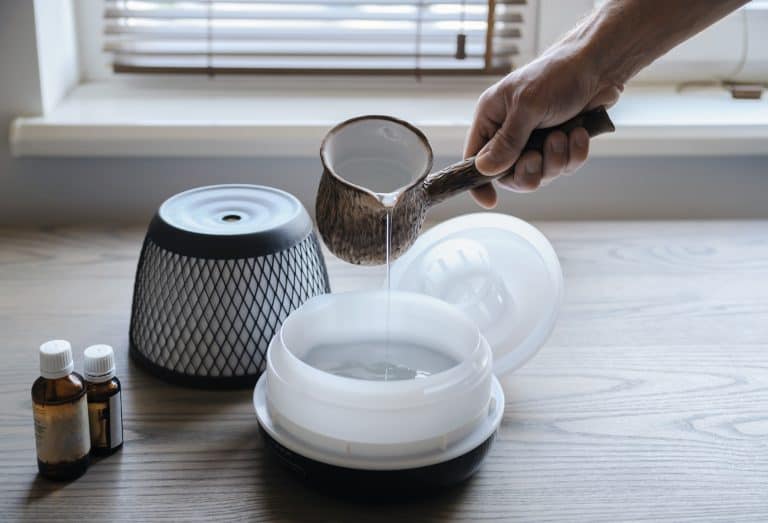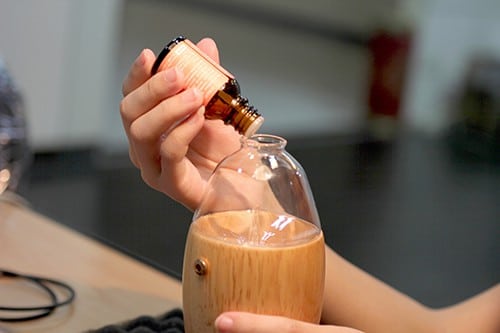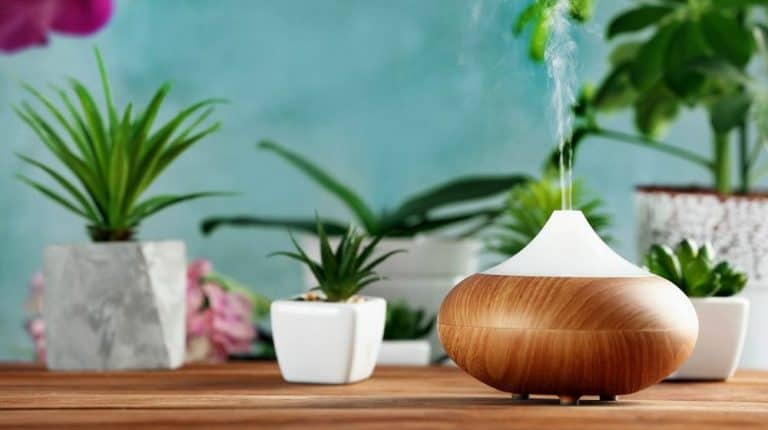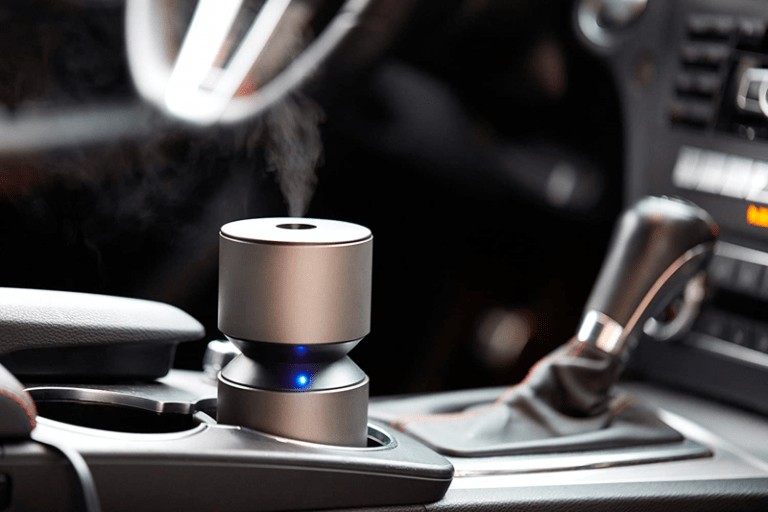Diffusers and Humidifiers: Knowing the Difference Matters
Diffusers and humidifiers are often mistakenly thought of as being the same. It is important to know that they are similar in some ways but are not the same, which brings up a number of questions like:
- Can a diffuser be used as a humidifier?
- Can you put essential oils into a humidifier?
- Does a diffuser add moisture to the air?
This article will explore both the similarities and the differences so you can determine the one that’s the best fit for your personal needs.
Defining the Diffuser
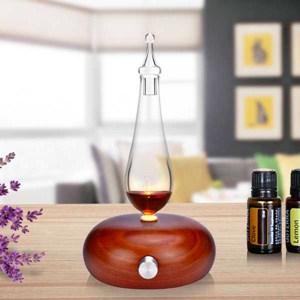
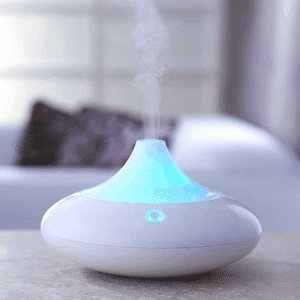
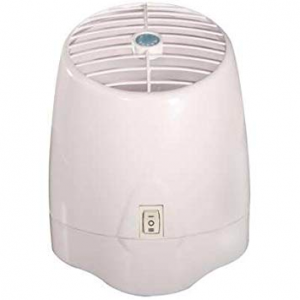
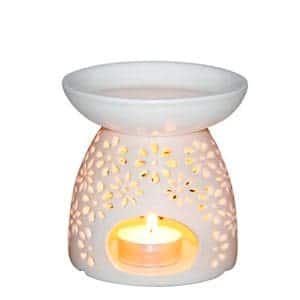
Diffusers are often associated with the use of essential oils. They nebulize then distribute liquid into the air so it can be inhaled and absorbed by the body. Commonly, the liquid is a mixture of water and essential oil but can be straight essential oil.
There are four basic types of diffusers for use with essential oils: those that nebulize without the use of water or heat, ultrasonic which delivers a cool mist mix of water and essential oil, evaporative that utilizes a fan blowing system, and heated units. Finding the best essential oil diffusers will depend on such things as what you intend to use it for, the size area you wish to cover, and where you want to use it at (in the car, at your office, in your home, etc.).
Why Choose a Diffuser?
A diffuser is ideal for spreading essential oils into the air for medicinal reasons, for the pleasurable aroma or for both purposes. If you are studying for an exam and would like to enhance your concentration, diffusing peppermint essential oil has been proven to stimulate the brain. Are you congested? Adding a little eucalyptus essential oil into a diffuser can loosen the mucus in your chest right up. Maybe there is sickness in your house and you’d like to prevent the illness from spreading. Tea tree, oregano, lavender and a host of other essential oils are ideal for killing germs and can be diffused alone or in a blend. Or, perhaps you’d simply like to breathe in a refreshing scent without all the chemicals used in common household air fresheners. Essential oils like cinnamon, peppermint, geranium rose, and sandalwood are favorites for their delicious scents.
When Not to Choose a Diffuser
If you are looking solely to moisturize the dry air in a room, a diffuser may not be the best choice unless the area you wish to cover is quite small in which case using a diffuser without essential oil in it is possible. For a larger area, the humidifier might be a better option. However, if you are wanting to moisturize the air in your baby’s room but would also like to add an essential oil, like lavender, to help him sleep well, a diffuser and humidifier combo would best serve your needs.
Humidifier Functions
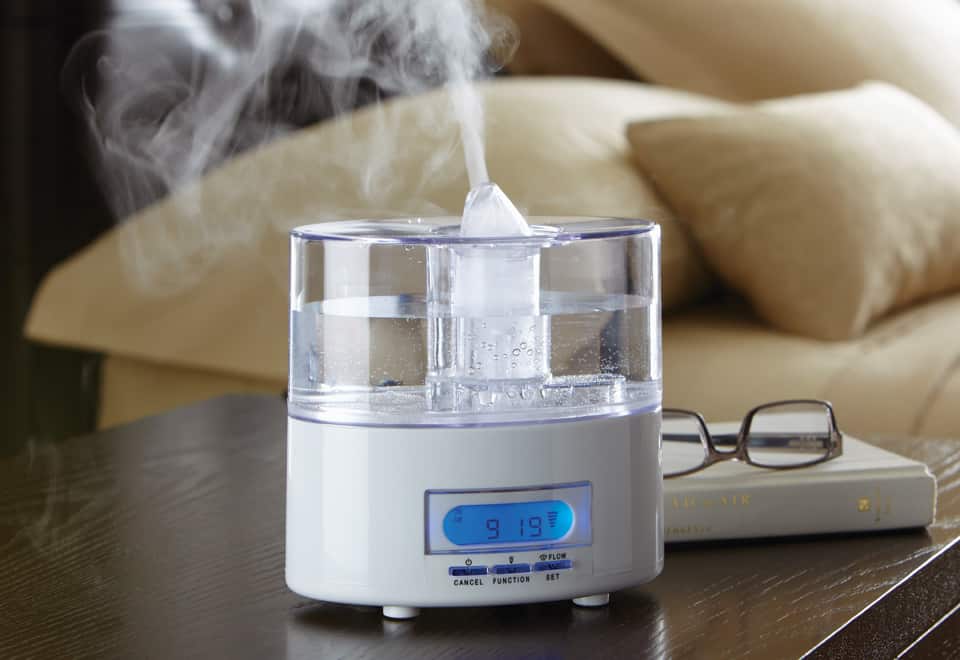 If you live in a dry climate, such as in the mountains, you may find the air is too dry. Even in humid climates, when the furnace is running during the cold months, the air tends to dry out. Dry air can be the source of nosebleeds, overly dry and chapped skin, and dried out sinuses. You can purchase a humidifier that puts out cool or warm mist, based upon your preference. They are available in tabletop type models, portable units, or even devices that can built in to a furnaces’ ductwork.
If you live in a dry climate, such as in the mountains, you may find the air is too dry. Even in humid climates, when the furnace is running during the cold months, the air tends to dry out. Dry air can be the source of nosebleeds, overly dry and chapped skin, and dried out sinuses. You can purchase a humidifier that puts out cool or warm mist, based upon your preference. They are available in tabletop type models, portable units, or even devices that can built in to a furnaces’ ductwork.
When to Choose a Humidifier
 Humidifiers are able to disburse moisture into a large area, quickly and for a long period of time. They are perfect for dealing with dry air in the winter and in mountainous and desert-like climates and are useful for moistening the respiratory system during cold and flu season too. Humidifiers also cut down on dry air damage to the home like floor and wall cracks. In the event that you need the services rendered by a humidifier but would like to add the benefits of essential oil into the air, some humidifiers come with an essential oil tray.
Humidifiers are able to disburse moisture into a large area, quickly and for a long period of time. They are perfect for dealing with dry air in the winter and in mountainous and desert-like climates and are useful for moistening the respiratory system during cold and flu season too. Humidifiers also cut down on dry air damage to the home like floor and wall cracks. In the event that you need the services rendered by a humidifier but would like to add the benefits of essential oil into the air, some humidifiers come with an essential oil tray.
When Not to Choose a Humidifier
If you are wanting to distribute essential oils into the air, especially in a small space and would like a decorative and relatively inexpensive device in which to do so, a humidifier may not be the best option. Humidifiers tend to be bulkier than diffusers and more costly as well.
Diffuser and Humidifier Combination
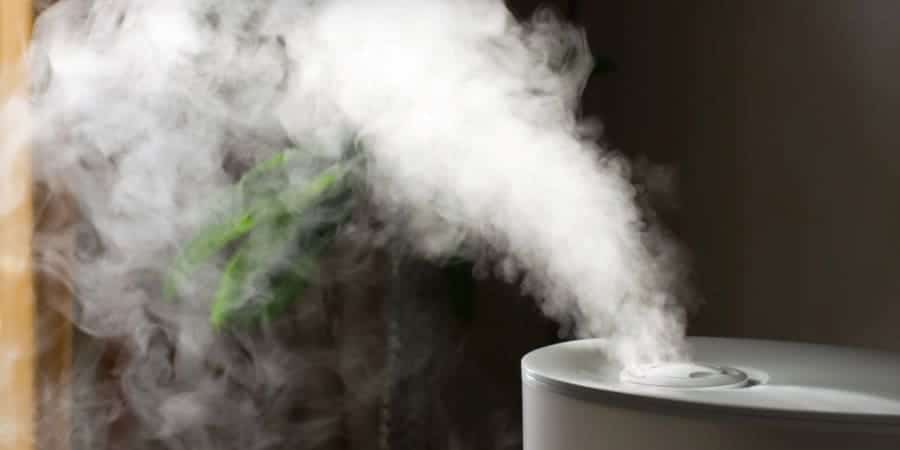
A diffuser and humidifier combo unit combines the best of both worlds. It is able to add moisture into the air while disbursing essential oil at the same time. It can also handle servicing a decent amount of area. If you have the need to moisturize dry air but would also like to add the medicinal or pleasure benefits of essential oil to the mix, this may be the ultimate option for you.
Diffuser and Humidifier Differences and Similarities
Diffusers and humidifiers are alike in a number of ways but are definitely different in other ways. The information below will further help you in distinguishing them:
Purpose
The task diffusers and humidifiers perform are one of the most notable differences between the two. A diffuser is generally sought for disbursing essential oils into an area which might be a small space or can also be an entire home or office. A humidifier’s purpose is to moisten dry air, usually in a large area for an extended length of time.
Volume and Size
Since it’s common for humidifiers to be required to service a large area and to run for a long time period, they tend to be larger so they can hold more water. Even when humidifying only one room, a unit has to dispense a good amount of water in order to raise the air’s moisture effectively. Diffusers, however, range in size. While there are large units for the purpose of dispensing essential oils into an entire home or office, most are smaller and some are even miniature versions for tight quarters or single-person use such as travel size versions or those for the car. The size of the water tank is almost always larger in humidifiers.
Operation Method
One of the main differences between diffusers and humidifiers is the way in which they work. Humidifiers spray out moisture into the air by the use of a nozzle to achieve the goal. Diffusers run on ultrasonic vibrations which mix with mist within the tank and are ultimately then disbursed into the air.
Noise
The sound that a diffuser or humidifier makes is largely determined by the individual unit you choose. Diffusers often make a hissing or spraying noise which can be found pleasant and soothing…or irritating. Humidifiers can be loud and obnoxious, especially the older units, but you can find models that promote little to no noise as well.
Health Effects
Both units have health benefits and drawbacks. While diffusers are appreciated for their ability to disburse essential oils which are proven to be beneficial to your health, some produce harmful LED light. Humidifiers, on the other hand, moisten dry air which is certainly a plus for good health but can be very destructive to one’s health if they are not properly maintained and germs build up. Humidifiers may also draw insects and the heated units are a risk for small children and pets. Both, when plugged in, tend to emit EMF, or electromagnetic radiation, which is a growing concern to the public. There are a number of devices that can be purchased, however, to counteract EMF.
Cost
The price tag on either unit, a diffuser or a humidifier, can greatly vary. While a diffuser is often thought to be less expensive to initially purchase, there are an increasing amount of special features being added to them to make them more sophisticated which is evident by the price. Essential oil diffusers require essential oil which, depending on the quality, can certainly cost a hefty fee. Humidifiers are usually larger so the initial cost may be more but because they generally run on water alone, they are less expensive when it comes to maintaining them.
Airing it All Out
Doing your research is always a good idea for choosing the best aromatherapy diffuser and humidifier. When deciding on a device, be sure to consider the purpose you want one for, the quality of the product, the quantity of space you want to cover and the price of the unit as well. With the information in this article, coupled with your personal preferences, you’ll be well on your way to purchasing the best diffuser and humidifier for your individual needs.
